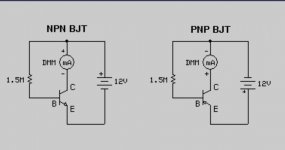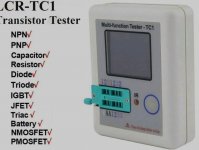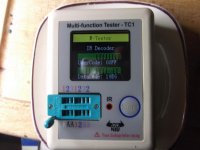Those TC-1 testers are good for silicon parts except older germanium ones. They all do LCR.
I have a TC-1 and discovered after it arrived that it also tests IR remote controls. The on line manual tells you how right at the bottom.
For germanium parts and high power output transistors I fall back to my home made one with a range of collector current settings. It was made to recreate the graphs in data sheets and can do TO3 lumps on heat sinks at several amps. I built it in the 1970s.
The first upgrade for my home made one was to add an electronic calculator for working out the HFE followed by a bench power supply for IC above the on board 100ma.
It took a good low cost unit for me to upgrade.
I have a TC-1 and discovered after it arrived that it also tests IR remote controls. The on line manual tells you how right at the bottom.
For germanium parts and high power output transistors I fall back to my home made one with a range of collector current settings. It was made to recreate the graphs in data sheets and can do TO3 lumps on heat sinks at several amps. I built it in the 1970s.
The first upgrade for my home made one was to add an electronic calculator for working out the HFE followed by a bench power supply for IC above the on board 100ma.
It took a good low cost unit for me to upgrade.
Attachments
If you lack faith in the "Transistor Tester" measurements, you can measure L and C with a computer and sound card. Here's a very simple method:
https://icom.hsr.ch/fileadmin/user_.../MAH_Klaper_2008_RLC_Meter_EN_elektro0608.pdf
Or there's other software like Speaker Workshop.
http://www.claudionegro.com/
Maybe the free version of Liberty Instruments' Praxis:
http://libinst.com/PRAXIS.htm
https://www.daqarta.com/dw_0azz.htm
https://icom.hsr.ch/fileadmin/user_.../MAH_Klaper_2008_RLC_Meter_EN_elektro0608.pdf
Or there's other software like Speaker Workshop.
http://www.claudionegro.com/
Maybe the free version of Liberty Instruments' Praxis:
http://libinst.com/PRAXIS.htm
https://www.daqarta.com/dw_0azz.htm
Wait, that's not an LCR (Inductance-Capacitance-Resistance) meter. An LCR meter will not help with measuring a transistor.
The circuit you show will sort-of measure a transistor's beta, but transistors are temperature sensitive and that may be the cause of the variation you see.
The circuit you show will sort-of measure a transistor's beta, but transistors are temperature sensitive and that may be the cause of the variation you see.
The unit in the photo is a universal component tester and will test most two or three leaded components.
They have there limitations but are very quick and easy for basic testing.
They have there limitations but are very quick and easy for basic testing.
If you’re going to use it more than once a year, buy an inexpensive one. If you’re going to use it once a week, buy a nicer one. If you use it every day, buy a really good one.
If you are thinking of an LCR meter, you might want to consider the Dayton Audio DTS3 (from Parts Express) -- it's very accurate at audio frequencies, and can also derive Thiele-Small parameters for loudspeakers.
The DTS3 is a file server.If you are thinking of an LCR meter, you might want to consider the Dayton Audio DTS3 (from Parts Express) -- it's very accurate at audio frequencies, and can also derive Thiele-Small parameters for loudspeakers.
LCR meters can be a bottomless money pit. You can get something that "measures inductors and caps" for $10, and it will work. If you want to accurately measure caps and inductors at high frequencies (say 5 frequencies up to 100 kHz) along with measuring Q and D, you're getting into the $1k range. If you want to measure parasitic properties in the MHz range... well, time to start talking to the bank about financing.
You can also use the lcr meter for checking pcbs for higher speed snd ensuring the same characteristics of traces.
If you don't need measurement up to 100kHz, the handheld Tonghui TH2822A is good bang-for-the-buck, around $200 : https://www.aliexpress.us/item/2251...72!65297578527!sea&curPageLogUid=GYZn9Sil6CaW
To get 100kHz you need the TH2822C which adds about another $100.
To get 100kHz you need the TH2822C which adds about another $100.
I would recommend a DE-5000 for a little under $200. Very accurate and relatively easy to use. While I have a lab grade Wayne Kerr, I find myself using my DE-5000 for day-to-day usage since it does 99% of what is needed.
Hal
Hal
Speaking of the DaytonAudio DATS-3 -- there are some technical issues with Win11 which are discussed on their website. (FWIW -- there are a lot of other equipment which may have Win11 issues, all seem resolvable.)Sorry, DATS 3
Isn't that the case with any of those 'newer' versions from Silicon Valley?Speaking of the DaytonAudio DATS-3 -- there are some technical issues with Win11 which are discussed on their website. (FWIW -- there are a lot of other equipment which may have Win11 issues, all seem resolvable.)
I've never had a 'perfect' version of Windows since I got Windows 311.
Besides, it's designed by humans, some without a clue, others just hoping for a paycheck or a raise, and yet others with big ideas.
- Home
- Design & Build
- Equipment & Tools
- Do I need an LCR meter?


